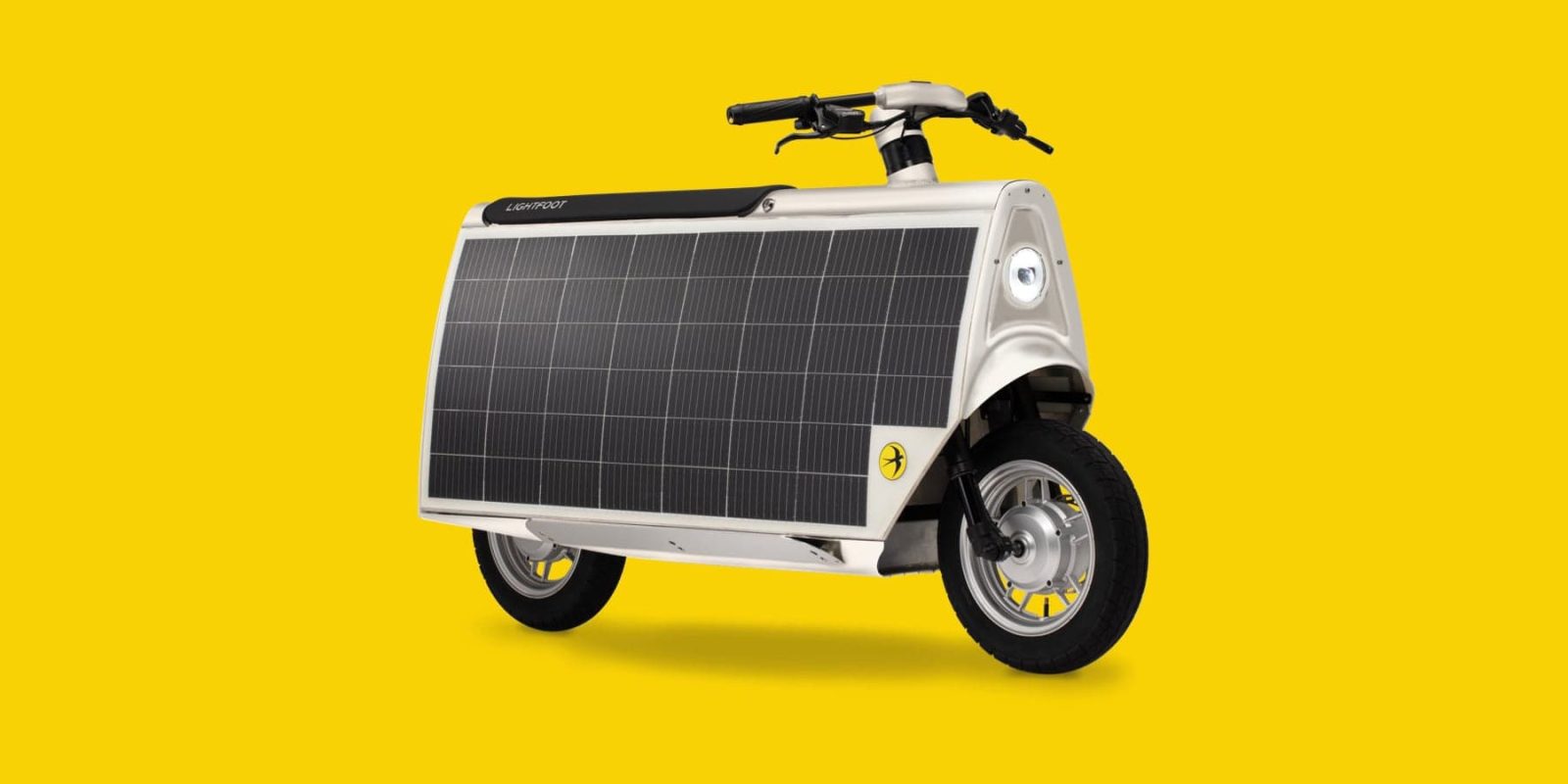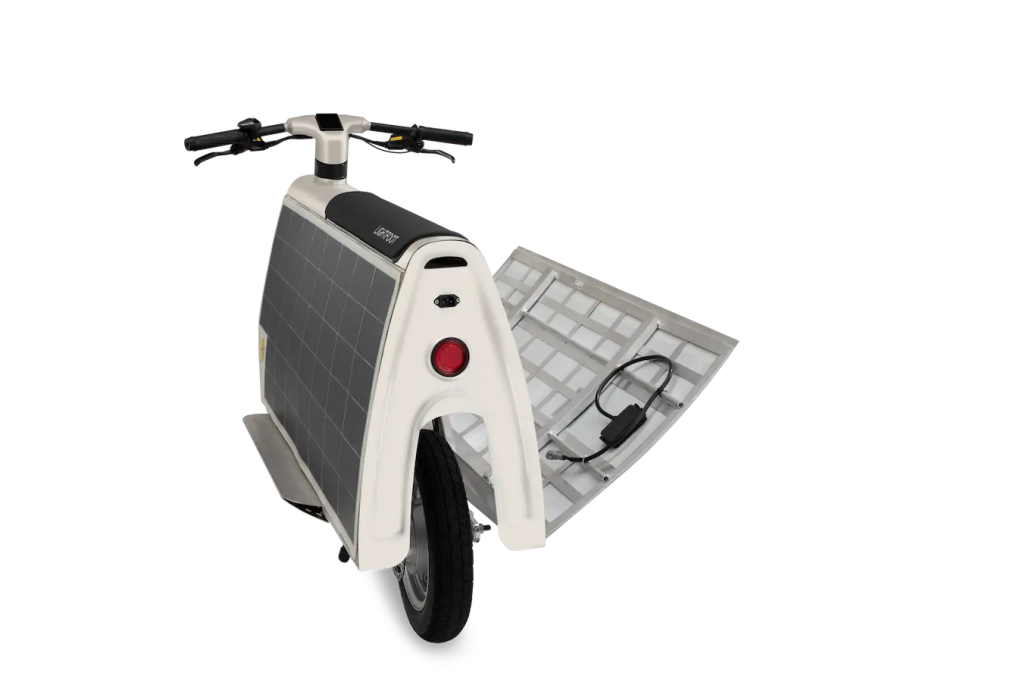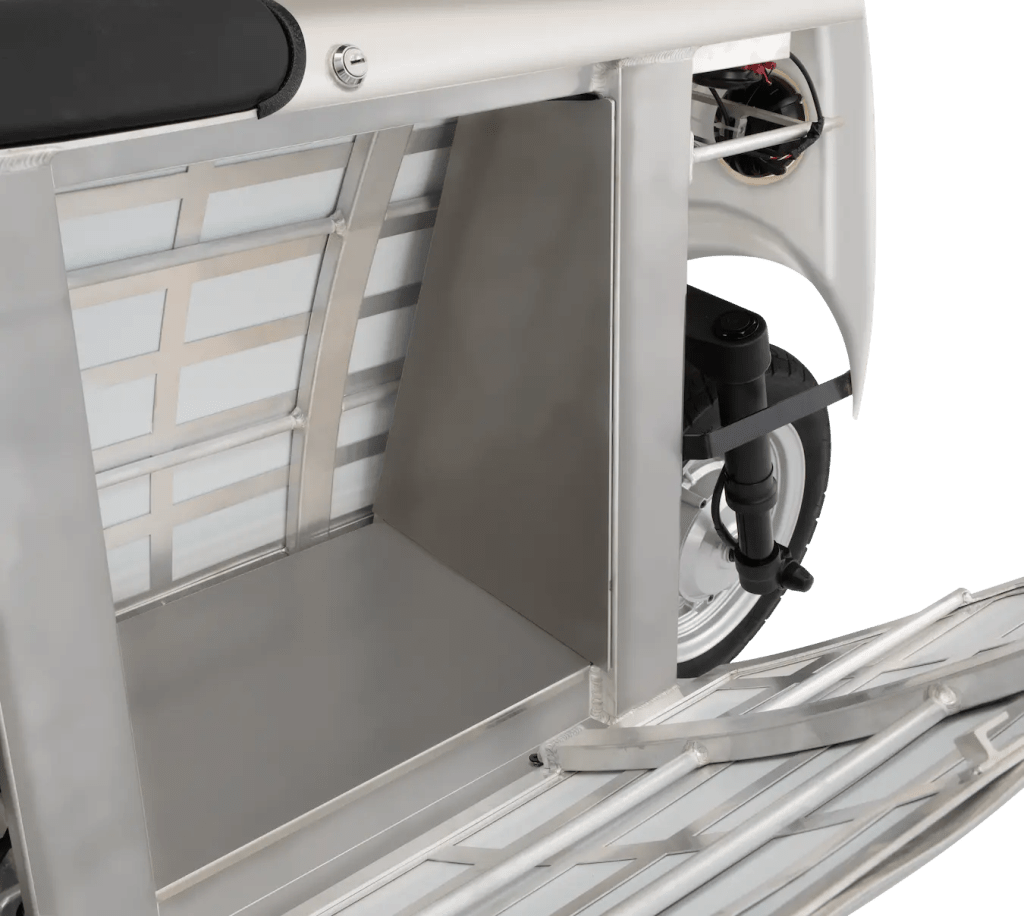
Cargo scooters are a uncommon breed, filling a distinct segment that exists between typical e-bikes/e-scooters with minimal storage and bigger cargo-specific fashions designed for utility. However that dearth of cargo scooters could also be altering, primarily based on a number of fascinating new fashions we’ve seen recently, together with the not too long ago unveiled Lightfoot cargo electrical scooter.
But in contrast to the few different cargo scooters rolling round on the market, the Lightfoot has one main benefit: its built-in photo voltaic panels maintain it charged up straight from the solar.
It’s not the primary solar-powered scooter we’ve seen, but it surely’s undoubtedly essentially the most eye-catching mannequin but.
Developed by Otherlab, the Lightfoot electrical cargo scooter includes a pair of 120W photo voltaic panels on both facet, hiding a big 45.2 L (12-gallon) storage compartment. One panel is hinged, opening the complete facet of the car for simple cargo entry, then locking again in place for safe storage.
Additionally hidden away by these panels are the equally giant UL-certified 1.1 kWh battery and the 600W on-board charger (simply in case you do have to plug it into the grid for a faster cost than you’d get from the photo voltaic panels). In actual fact, the corporate claims an 80% cost is feasible in simply 90 minutes from a 110V wall outlet. Based mostly on the corporate’s figures, it appears to be like like photo voltaic charging is more likely to fill the battery at a charge of roughly 7-8% per hour (round 3 miles or 5 km of extra vary per hour of solar publicity). Which means heavy utility customers will probably nonetheless depend on the wall plug occasionally, however there’s nothing flawed with outside parking serving to to increase the vary.
The corporate charges the scooter’s vary as as much as 37 miles (60 km) per cost and claims an additional 18 miles (30 km) of vary might be added per day from the photo voltaic panels.
Which means the scooter may really be purely solar-charged when used for modest responsibility cycles, i.e. lower than 18 miles (30 km) per day. As the corporate defined, “In the event you solely want it for just a few quick errands a day, park it in your driveway and it’ll at all times be prepared for you. For a lot of riders, we’re hoping this implies saying goodbye to plug-in charging altogether.”

With a 20 mph (32 km/h) prime velocity, the scooter is alleged to be “bike lane authorized” with out requiring any extra license or registration.
The Lightfoot can also be designed to be straightforward to work on with minimal mechanical elements. The twin motor system depends on hub motors as a substitute of centrally mounted motors, that means there are not any chains or belts to take care of. Between these two 750W rated (1 kW peak) motors, the scooter ought to rise up to hurry fairly rapidly whereas laying down almost 2,000 watts of energy.
The corporate is providing a 1-year guarantee on the complete scooter, with a fair longer 2-year guarantee for the foremost elements consisting of the body, motors, controllers, brakes, lighting, and entrance suspension. The scooter can also be lined by an “ironclad buy-back assure” with the corporate promising to purchase the scooter again from any riders who’re “unhappy with their buy for any motive.”
Set to start deliveries in January 2025, the Lightfoot is now out there for buy with an MSRP of US $4,995.

Electrek’s Take
Look, I’m break up right here. My inside mechanical engineer is drooling over this factor, whereas my inside MBA is questioning the way you promote it to a broader market than… individuals like me. My two skilled backgrounds have usually been in battle earlier than, however that is peak engineer’s delight meets ultra-niche aesthetic.
Positive, I’d 100% experience the hell out of this factor. I’d experience it in every single place with zero qualms in regards to the look. However I’m in all probability not the most effective consultant of the common scooter buyer since I have a tendency in direction of the tech nerd facet of the spectrum. And so I hope that the Lightfoot can discover wider enchantment than I worry it might be restricted to.
Oh, and for all of these able to hammer out the “AcTuAlLy ThAt’S NoT tHe MoSt EfFiCiEnT WaY tO dO iT…” feedback, I feel that’s lacking the purpose. The entire thought right here isn’t to maximise each photon, however moderately to not waste the ample daylight that in any other case merely bakes the paint on each different scooter and moped on the market (and don’t get me began on the “moped” linguistic purists). Positive, you’re in all probability solely ever getting considerable photo voltaic charging from one panel at a time, however why not maximize your probabilities of catching these rays at any time when you may?
So all informed, I really like this factor. I simply surprise how many individuals will like it as a lot as I do.
FTC: We use revenue incomes auto affiliate hyperlinks. Extra.


